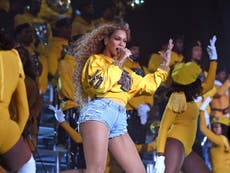Beyoncé's performance at Coachella was an unapologetic celebration of black womanhood in the least likely of places
The biggest pop star of our time taught us all a lesson; that when it comes to performing black culture, black performers do it best
Whether you love her or hate her, you knew – like everyone knew – that Beyoncé’s return to the music stage at Coachella was going to be show-stopping. Over the years, the pop superstar has earned the title of the greatest living entertainer. And at Coachella, she carried that title with ease. For nearly two hours, the Houston native sang and danced non-stop, and in the process treated the world to a performance that will go down in history. However, while we can continue to (rightly) praise the Grammy winner for the energy of her set, it was the combination of subtle and overt references to black culture and black womanhood that made her performance so spectacular.
First appearing on stage dressed as a Nubian Queen, the 36-year-old made it clear that her performance, like the album Lemonade, was going to intentionally centre and celebrate her identity as a black woman and the concept of black female empowerment. Dressed in a black Balmain leotard and headpiece and dripping in jewels, her costume sent a bold message. While Malcolm X may be right in that “the most disrespected, unprotected and neglected person in America is the black woman” and while the world still fails to appreciate us, Beyoncé communicated to the world that black women are royalty.
Changing out of her black Balmain ensemble and into a yellow hoodie and denim shorts, Beyonce then took us to school, but not just any school – a historic black university. While her hoodie may be easy to dismiss, like her whole performance it was a statement. The school motif on the front was made up of the Greek letters “BΔK”, or Beta Delta Kappa – the delta sign is for four, which is well-known to be her favourite number. In this, she acknowledged the black fraternities and sororities, who often take their names from three Greek letters. Yet she was also telling everyone else that she is a black woman who is now playing the world on her own terms and we are part of the Beyonce sorority. Another significant and timely statement when statistics in America and in the United Kingdom show that black women are less likely to be in positions of power when it comes to their chosen professions.
Appearing at the top of a pyramid made out of bleachers, Beyonce embarked on a “black college performance”, which comprised a marching band, steppers and majorettes. Beyonce used this aspect of black culture to disrupt Coachella’s usual indie and bohemian look and feel. For so long, white performers and festivalgoers have co-opted minority cultures, from hip hop music and style to Native American headwear, all in the name of “looking cool” for a weekend festival. Beyonce taught us all a lesson: that when it comes to performing black culture, black performers do it best.
Halfway through Beyonce’s set, she poignantly addressed her own position in history with the words: “Thank you for allowing me to be the first black woman to headline Coachella.” It was a nod to the present that heavily acknowledged the past. It is why she sang the gospel song Lift Every Voice and Sing, otherwise known as the African American anthem, and it is why she intertwined Nina Simone’s jazz classic Lilac Wine into her set. Beyonce knows the importance of acknowledging historical black musical success and those who laid the foundations for her to be the first black female performer to headline Coachella. Her gratitude was directed firmly towards those giants of the industry.
While we can applaud Beyonce’s musical choices and visuals for paying tribute to blackness, even her guests were a statement. Yes, she was joined on stage by her husband, but reuniting Destiny’s Child and having Solange, her sister, onstage was a powerful ode to black sisterhood. Black women make no secret that we are each other’s biggest champions when navigating a world of misogynoir (the specific sort of sexism and misogyny that is directed at black women). Beyonce reminded black women of the support we give each other in our biggest and most defining life moments.
When Beyonce stepped onto the Coachella stage, she seemingly had three intentions: to cement her position as the greatest entertainer of this generation, to bring black culture to the fore and to deliver a masterclass in black female empowerment. I think anyone who watched her set can agree that those intentions were transferred seamlessly into reality.



Join our commenting forum
Join thought-provoking conversations, follow other Independent readers and see their replies